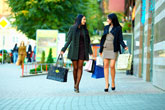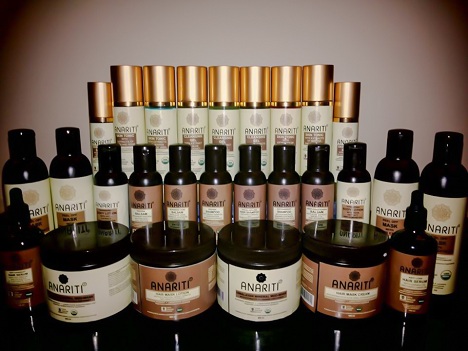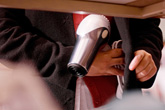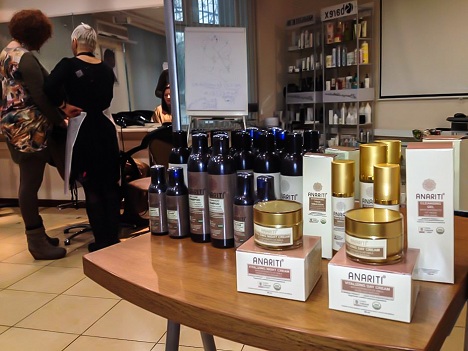Goa-based company taps Russia’s emerging market for organic cosmetics

Vikram Naharwar, president of Amsar. Source: Alexandra Katz
Almost all cosmetic products these days have a shining “100% natural” label. However, there is hardly any mass-market brand that offers truly organic or natural cosmetics in Russia. The main idea behind natural and organic is that cosmetics should be composed of organically-produced ingredients, renewable flora, fauna and mineral resources and be free from petroleum and other synthetic components.
Amsar Pvt Ltd, one of India's first manufacturers of standardized botanical extracts and phytochemicals, has been working with herbal extracts since 1963. Apart from supplying extracts to large pharmaceutical and cosmetic brands, it has its own line of Ayurvedic products sold in India under AmsarVeda brand.
It took about three years for the company to create a new line of personal care products customized for the Russian market. From this, the Anariti brand was born.
“In different counties there are different requirements for cosmetic products. In Russia, for example, the hair is different, skin is different. It takes a lot of time to develop products that meet the requirement of the country specifically,” Vikram Naharwar, president of Amsar, says.
Apart from Russia, Amsar is currently selling its natural cosmetics in Holland and Germany, but under a different brand. Products under the Anariti brand are being sold in Goa where the population of Russian consumers is high during the peak tourist season.
Amsar has roped in Moscow-based ItalCosmetika, a distributor of hair care brands from Italy. “We saw the future in organic segment and I searched all over the world for an organic brand. That’s how we found Indian herbal extract manufacturer Amsar,” Elena Polonskaya, a senior executive with ItalCosmetika says.
The first commercial shipment of Anariti products has reached Russia several months ago and the sales are about to start. “We are working on branding now, talking with parlors, yoga centres and specialized retail stores to sell our products,” Polonskaya says.
Growing market
Dr. Kirsten Huettner, an analyst at ekokosmetika.ru, a professional portal for natural and organic cosmetics, estimates the Russian market for natural and organic cosmetic at about $135 million in 2013, growing nearly 30 percent since 2012. The average market share of natural cosmetics in Europe is 3-4 percent.
Source: Alexandra Katz
Considering that the whole cosmetic market in Russia is estimated at about $14.8 billion, the organic segment is just comprises 1 percent. Huettner, however, strongly believes that the segment’s market share should grow to 3 percent if Russia keeps following global trends.
According to Organic Monitor, worldwide sales of organic cosmetics stood at about $9 billion last year and the segment is growing at 5 percent per year. So far this segment has only 2 percent share of the cosmetics market. Research firm Kline & Company in its latest study says despite variable economic conditions, the natural personal care market continues to see strong growth and reached $29.5 billion at the manufacturers' level in 2013. Huettner, however, notes that this figure both natural and “so-called” natural cosmetics, labelled “inspired by nature” in professional circles, and the size of genuine natural cosmetics market is about $13.28 billion.
Although so far the biggest markets for natural and organic cosmetics are Europe and USA, according to experts, BRICS countries, Russia and China particularly are the fastest-growing natural personal care markets.
Natural competition
As it is a bit of a task for consumers to understand which brand among hundreds is actually natural or organic, certification of the products helps clear the doubts. There are several standards of natural cosmetics, including COSMOS (unites several European standards), NaTrue (unites largest European manufacturers) and the most strict USDA (USA).
Anariti obtained natural certificates from Bureau Veritas, a global testing and certification company.
“Eco certification is not mandatory anywhere for cosmetics,” Huettner says. “All eco certification systems are voluntary systems. While organic food products have to be certified and there is a law for Europe, but not for cosmetics.” Although Russia’s National Society of Cosmetic Chemists established BioRus, its standard for natural cosmetics in 2011, few products are certified and the standard is not visible in the market yet, Huettner adds.
Most of certified European brands are represented in Russia, with STYX, Weleda, Melvita, LOGONA and Dr.Haushka among leaders. However, according to Huettner, it is Russian domestic brand Natura Siberica that leads the market, although expert places this brand in “inspired by nature” category as not all its products have certification.
Source: Alexandra Katz
Natura Siberica so far is the only Russian brand that received ICEA certification for some of its products. Introduced in the market in 2009 by Moscow-based Pervoe Reshenie (First Decision) cosmetic company, the brand promotes unique concept of personal care products made from herbs and plants collected in Siberia.
Industry analysts interviewed for this article could not name any Indian brands that offer natural cosmetics, although there are plenty of Indian Ayurvedic products sold in Russia with such brands as Himalaya, Dabur, Himani and Biotique leading the sales.
ItalCosmetika’s Elena Polonskaya says Indian ayurvedic cosmetics are quite popular in Russia, mainly on account of their cheap price probably, but they are not up to the mark when it comes to quality, branding and packaging. “What we target is the luxury, expensive segment”, she says. “Our cosmetic products comprise both ayurvedic approach and high-end technologies as its manufacturer is first of all a research company.”
Kirsten Huettner says she has heard of the Anariti barnd and has included it “green category” (truly natural cosmetics) of her classification. “There are some brands quite popular in Germany, for example Lakhsmi and Khadi, but I think that are partially German-Indian brands,” she adds.
According to a consumer demand study conducted by Synovate Comcon in 2013 across Russia, while choosing cosmetics products Russian women consider their previous experience with the brand and absence of allergenic reactions as the topmost factors. About 15 percent of the women surveyed said they paid attention to added herbs and vitamins while such factors as price, brand, package or the country of origin are much less important.
All rights reserved by Rossiyskaya Gazeta.
Subscribe
to our newsletter!
Get the week's best stories straight to your inbox



